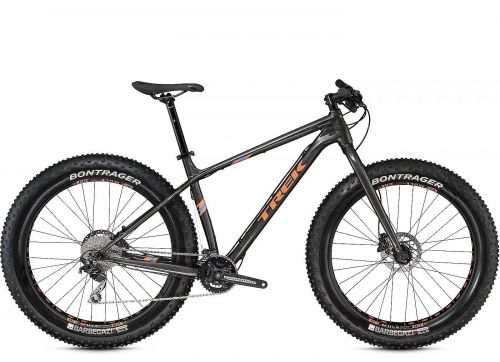LOS ANGELES, Calif. (BRAIN) — In a legal motion that contains more A-list names than a TMZ episode, Trek Bicycle's lawyers have responded to a trademark infringement case filed by a company that claims to own the rights to the late actor Chris Farley's name. The company, Make Him Smile Inc., objects to the name of a Trek fat bike model, the Farley. Make Him Smile's president is Chris Farley's brother, Kevin Farley.
Trek says the suit is groundless and, in a motion filed Monday in the U.S. District Court in Los Angeles, asked that it be dismissed at the next scheduled court hearing, on Dec. 18.
Not surprising for a motion filed in L.A. that revolves around the rights of a public figure, the motion cites cases involving well-known names from Marilyn Monroe to Béla Lugosi, Tom Waits to Princess Diana, Vanna White to Bob Marley.
Trek's motion first claims that Make Him Smile has no standing under California law. It notes that in a 1966 case, Lugosi v. Universal Pictures, California's Supreme Court ruled that a dead person has no right to their likeness, and that any rights that existed did not pass to his heirs. The California Legislature later passed a "Right of Publicity" act allowing descendants of dead celebrities to retain rights, but, Trek pointed out, the law only applies to California residents and Chris Farley lived in Illinois at the time of his death in 1997. Trek noted that in 2005, the estate of Marilyn Monroe was unsuccessful in using this law to stop a company from marketing images of Monroe, because the actress, although she died in California, was a legal resident of New York. Trek also notes that Illinois did not have a right of publicity statute at the time of Farley's death, although the state enacted such a law in 1999.
Trek's motion also argues that Make Him Smile cannot claim that the bike company used "a distinctive attribute" of Chris Farley in naming or marketing the fat bike. The federal Lanham Act prohibits misuse of a celebrity's persona to suggest an endorsement. Musician Tom Waits won a landmark case against Frito-Lay, which had used a jingle sung by a Waits imitator in a commercial. "Wheel of Fortune" hostess Vanna White used a similar argument in a case where Samsung used a robot that imitated White in an ad. The company that owns rights to Bob Marley's image was able to shut down a competing T-shirt brand under the same precedent.
But Trek said its bike did not borrow any distinctive attribute of Chris Farley.
"Plaintiff is unable to identify any such distinctive attribute that could support its claim. Plaintiff does not allege that Trek used the name "Chris Farley," his likeness, or anything unique to his career. Plaintiff also does not allege that any attribute of Chris Farley appears on Trek's bikes or in advertising in a manner that suggests Chris Farley's endorsement. That explains why Plaintiff chose not to include any visual representations of Trek's fat bike or promotional material in its complaint," the motion reads.
Trek never used the actor's first name in any marketing. Indeed, the company's lawyers noted that when Trek tried to trademark the bike model name, the United States Patent and Trademark Office rejected the application, saying "the applied-for mark is primarily a surname." Trek did register Farley as a trademark on the USPTO's Supplemental Register, which doesn't afford as much protection.
Trek's final argument is that its use of the Farley model name is protected under "nominative fair use." Under nominative fair use, a company is allowed to reference a trademarked name or brand if there is no implied endorsement or sponsorship and where the trademarked name is being used in a way that is incidental to the description of the product for sale. So Trek claims that it's only using Farley as a descriptor, while the Trek brand on the bike is what the company is really selling. Trek cited a case brought by New Kids on the Block, who objected to a newspaper's use of the band's name in a telephone poll asking which band member was most popular. The court found that the newspaper reasonably used the New Kids name to communicate its message, without suggesting an endorsement. The paper wasn't selling New Kids or suggesting a New Kids' endorsement: it was simply using the trademarked name to communicate its message about the poll.




